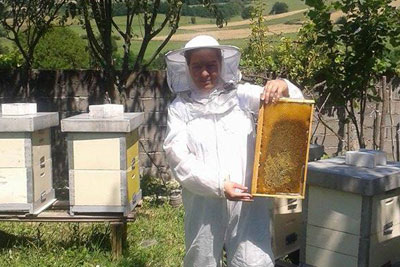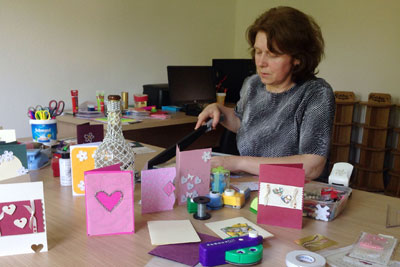Building businesses, and inclusive peace, in Kosovo
Budding entrepreneurs from minority groups get training and support from a joint EU-UN Women-UNDP project to spur lasting recovery in post-conflict Kosovo.Date:

Elvanë Qorri is a single 36-year-old woman from the city of Gjakova in western Kosovo (under UN Security Council Resolution 1244)[1] and a member of the Ashkali minority – a group with limited access to employment, health and public services that is subject to endemic discrimination.[2]
Despite such challenges, Ms. Qorri decided to change her career as a music teacher and start her own beekeeping business. She bought six beehives and has been anxiously awaiting the spring so she can start making honey. She also wants to produce food with honey and is working on her business plan.
“I would tell women to think of starting a business of their own so that they don’t remain financially dependent on their families and husbands,” she says.
During times of war, the loss of family members often brings economic insecurity. Recovering financially and generating a stable income is often the biggest challenge women face post-conflict, as they grapple with becoming the bread-winners for their families.
Ms. Qorri says that although she had nurtured the idea of starting a business for a long time, she only began working towards it after taking part in trainings under the joint EU-UN Women-UNDP project titled “Enhancing Women’s Participation in Peacebuilding and Post-Conflict Planning in Kosovo.” The project supports trainings organized by local NGOs – in this case, the Network of Roma, Ashkali and Egyptian Women’s Organizations in Kosovo in cooperation with the European Centre for Minority Issues.
Between February 2012 and October 2014, the project provided instrumental seed funding for civil society organizations in Kosovo, through 10 micro-grants amounting to almost 220,000 Euros. Over 1,200 women have benefited directly, with many more reached by awareness-raising and capacity-building.
Along with training and assistance in writing her business proposal, Ms. Qorri got much-needed advice from trained and experienced beekeepers.
In Kosovo, women’s labour force participation is just 21.1 per cent, and their employment rate only 12.9 per cent.[3] The situation is even bleaker for women from minority communities. According to a survey, fewer than 6 per cent of the interviewed Roma, Ashkali and Egyptian women in Kosovo reported having paid employment and only 0.8 per cent reported being self-employed.[4]
Time Zenuni, a 49-year-old woman also from Gjakova, has been a single mother and the main breadwinner for her four children for 16 years, after losing her husband during the armed conflict. Two years ago, she started her own business making handmade postcards, envelopes and packages, and participated in trainings organized by two other NGOs (Women’s Association and Kosova Woman Initiative).

“This programme has assisted me in getting the needed knowledge to register and set up my own business,” says Ms. Zenuni, the proud owner of the company Kartolina Magjike (Magic Postcards). She currently employs two women and is seeking to expand her online presence. “I would advise all women to be courageous and start their own business because this will advance their position.”
Other civil society initiatives supported by the joint project aim to increase minority women’s participation in local governance, inter-ethnic cooperation, transitional justice, and raise awareness on women’s human rights, as well as monitor court proceedings related to women’s inheritance. Recommendations on improving court proceedings have also been produced and shared with institutions and international organizations.
Under the joint project, UN Women also provided policy advice to partners, including Members of Parliament, for the Kosovo Government’s Action Plan to implement UN Security Council resolution 1325 on Women, Peace and Security.
“The joint work of the EU and the UN in supporting women’s leadership at all levels has proven a success through making our commitments within UNSCR 1325 a reality,” says Flora Macula, UN Women’s Representative in Kosovo. “We have provided multiple forums for women’s voices to be heard by the Government, EU and UN leadership, ensured that their concerns are reflected in the Action Plan for the implementation of the resolution and directly supported women’s initiatives in post-conflict reconstruction through supporting civil society projects.”
UN Women’s office in Pristina is supporting implementation of the Action Plan and taking part in the global review.
[1]Kosovo in all subsequent references.
[2] According to UNDP 2012, while the average monthly salary per person in Kosovo is EUR 260 – the lowest in the region after Albania – Roma, Ashkali and Egyptian families’ average total income stays under EUR 120 a month.
[3] Kosovo Statistics and World Bank, 2014, Results of the 2013 Kosovo Labour Force Survey, p. 1.
[4] Kosovo Foundation for Open Society, 2009, The Position of Roma, Ashkali and Egyptian Communities in Kosovo, p. 32.